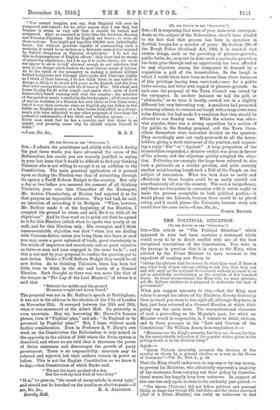[To THY EDT/OR OP TRH "SPECTATOR."] SIR,-I admire the persistence
and ability with which during the past three weeks you have advocated the cause of the Referendum, but surely you are scarcely justified in saying in your last issue that it would be difficult to find any thinking
Unionist who is not willing to accept it as an addition to the Constitution. The main practical application of it pressed upon us during the Election was that of submitting through its agency a Tariff Reform Budget to the country. But only a day or two before you assumed the consent of all thinking Unionists, your own late Chancellor of the Exchequer, Mr. Austen Chamberlain, at Buxton had rejected it as for that purpose an impossible solution. They had had, he said, no intention of extending it to Budgets. "When, however, Mr. Balfour made it at the beginning of the Election, I accepted the ground he chose, and said, Be it so, with all its objections." And he then went on to point out that he agreed to it for this Election (which when he spoke was nearly at an end), and for this Election only. His strongest, and I think unsurmountable, objection was that " when you are dealing with Customs-duties, unless you bring them into force at once you may cause a great upheaval of trade, great uncertainty in the minds of importers and merchants, and so great injustice as between man and man engaged in the same trade " ; and this is not met by your proposal to confine the question put to new duties. Under a Tariff Reform Budget they would be all new duties. As to thinking Unionists, there has been but little time to think in the stir and bustle of a General Election. Sach thought as there was, was more like that of the trooper in " The Lay of the Last Minstrel," of whom it is said that "Betwixt the saddle and the ground He mercy sought and mercy found."
The proposal was not in Mr. Balfour's speech at Nottingham ; it was not in his address to the electors of the City of London on November 25th. It emerged between the 25th and 29th, when it was announced at the Albert Hall. Its paternity is even uncertain. May we, borrowing Mr. Disraeli's famous phrase, term it "Popkins' plan," and ask: "Is England to be governed by Popkins' plan ? " Not, I hope, without much further consideration. Even in Professor A. V. Dicey's own work on the Constitution the Referendum is only named in the appendix to the edition of 1908 where the Swiss system is
described, and where we are told that it decreases the power of Swiss statesmen and discourages the growth of party government. There is no responsibility : measures may be
referred and rejected, but their authors remain in power as before. This is not the English Constitution as we know it to-day,—that Constitution of which Burke said : "'Ms not the hasty product of a day,
But the well-ripened fruit of wise delay."
"It is." he goes on, "the result of many minds, in many ages," and should not be knocked on the head in an election panic.—I






































 Previous page
Previous page